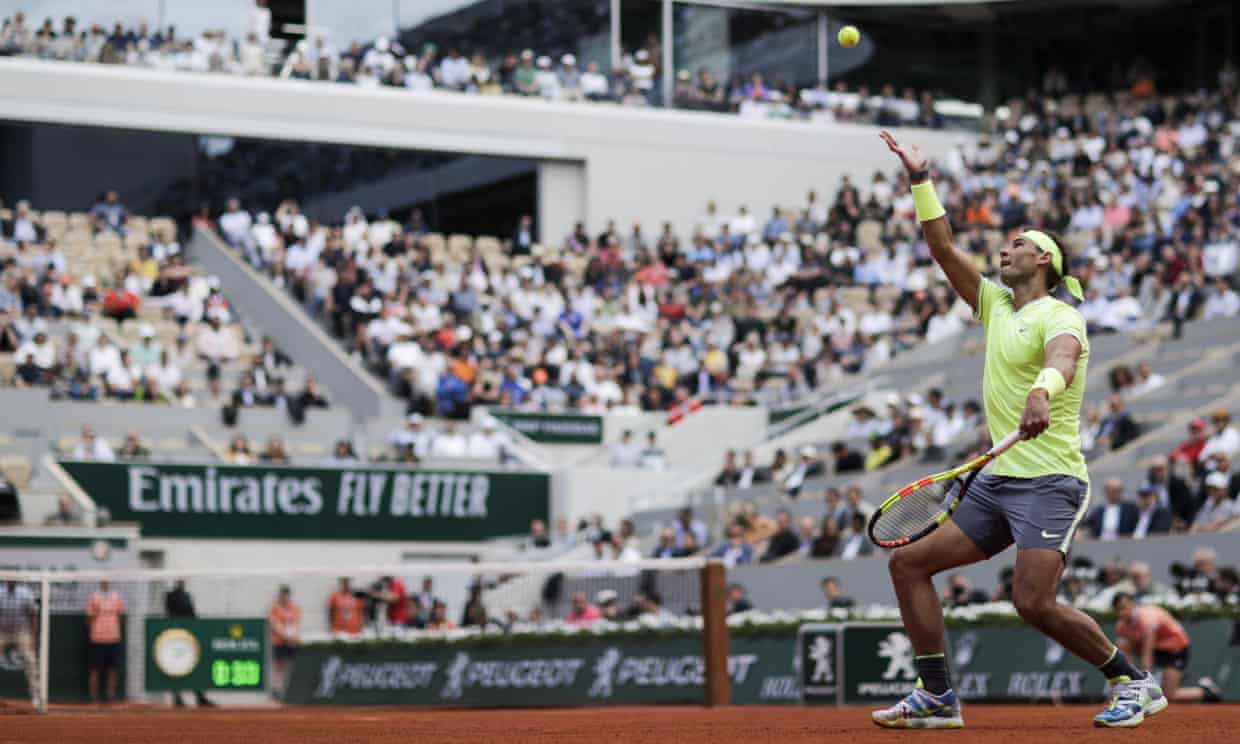The weight of history is bearing down on Rafael Nadal and Novak Djokovicmore heavily than usual this year, although there were no signs on day two of the championships that it would break them.
Nadal will have to stub a toe with some force getting out of bed each morning to experience anything like anxiety in the first week of the 2019 French Open– the 100th clay tournament of his career – as he pursues his 12th title here, six more than Bjorn Borg, a lone and distant challenger for male dominance on clay. He would also become the first player, man or woman, to win 12 singles titles at the same major; Margaret Court won 11 Australian Opens.
The 27-year-old qualifier, Yannick Hanfmann, was never going to delay Nadal long on Monday and the Spaniard’s medium-term challenges are just as benign. On Wednesday he meets another Yannick – Maden – who went through to the second round with a 7-6 (7), 7-5, 6-3 win over the Belgian qualifier Kimmer Coppejans. Maden has an ATP world ranking of 114.
In a revealing aside to Spanish journalists, however, Nadal admitted to serial doubt. “It’s very difficult to be convinced that you’re OK. I don’t know if many people are convinced about anything in this life. When you’re convinced about something, you’re very arrogant, because most of the time you can hope that something is going to happen, and have the desire for something to happen. But to be convinced? I’m almost convinced about nothing in this world.”
He added: “Every year is a new challenge.” Except some challenges are less arduous than others.
Beyond Maden lie names also unfamiliar to the casual observer: Miomir Kecmanovic, the world No 85 who saw off Denis Kudla in five sets and next plays David Goffin; the French wildcard Corentin Moutet, 110 in the world, or Argentina’s Guido Pella, seeded No 19; and 78th-ranked Juan Ignacio Londero or Richard Gasquet – all of whom advanced to round two in Nadal’s quarter.
It took Nadal nearly 10 minutes to hold at the start of his match against Hanfmann, fighting through four break points, but it was an illusion of struggle. He broke the German immediately, then went through the gears for a further hour and 46 minutes to crush an opponent ranked 184 in the world 6-2, 6-1, 6-3. It was a bigger mismatch than Deontay Wilder’s last fight, but prettier.
There were plenty of glorious strokes, most of them from Nadal, but a few, too, from the German, who hits hard and flat and plainly enjoyed his brief moment on the biggest stage, even if it turned out to be no more than a high-grade workout for the champion.
For now, Roland Garros and the refurbished Court Philippe Chatrier belong to Nadal. The world No 2 turns 33 on Monday and, even though there is no urge to bet against his adding to his collection of 17 majors, the man who followed him on to Chatrier on day two will push him all the way.
Djokovic (15 majors) has his own daunting goals: in 2019 it is reaching for a calendar slam, the first since the second of Rod Laver’s amazing achievements 50 years ago. The world No 1, slightly off the pace on clay this summer, brings with him the 2018 Wimbledon and US titles, as well as the Australian from this year. A second French title would give him ownership of all four majors at the same time but he would need to win in London and New York again to lay down a marker unlikely to be challenged in his lifetime: six consecutive slams. If he managed it, he would emulate the feat of Don Budge, who added to his 1937 Wimbledon and US titles the following year with all four.
To get over the line at Roland Garros, Djokovic will have to go through Nadal on the closing Sunday. It is some ask. But Djokovic showed in his opening match on Monday, when he dismissed the Pole Hubert Hurkacz, 6-4, 6-2, 6-2 with methodical coolness in an hour and 36 minutes, that his resurgent form in Rome – until Nadal stopped him in the final – is on the rise.
Kyle Edmund and Jeremy Chardy battled to within two games of a conclusion in a fascinating five-setter on Court No 1 when a tournament official decided at 9.23pm the light was too poor to allow a finish. It was a marginal call – especially as the forecast for Tuesday was unpromising. Edmund had ball in hand, seemingly willing to serve, with the score standing at 7-6 (1), 5-7, 6-4, 4-6, 5-5.


